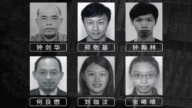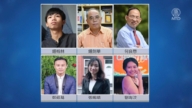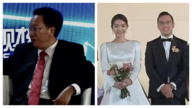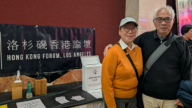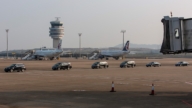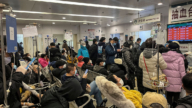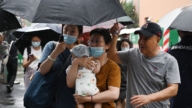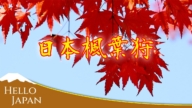【新唐人2012年7月14日讯】最近大陆民众到香港和台湾旅游的人数在日渐增加。薄熙来的倒台,十八大的召开,都吸引大陆民众想进一步了解大陆的真相。香港和台湾出版商为满足市场需要,积极出版被中共当局控制的那些所谓的政治禁书。大陆游客购买这些书刊后,很想带回国内阅读或者送人。然而,很多书在回国的时候却被海关扣下。大陆学者表示,中共当局把不同于官方论调的出版物,看得比毒品还要严重。
《美国之音》报导,在香港和台北比较大的书店里,都设有关于中国大陆政治和现代史书籍的专柜。有些大陆游客就在那里翻看,尽管那些书刊被中共当局列为禁书,但大陆游客说还是要带回国,因为亲朋好友在“排队等着看”。
大陆作家何永全表示,大陆很多人想了解真相,迫切希望能有一个途径看到相关方面的报导。
大陆作家何永全:“包括我自己在内,我也是很希望能看到那些书籍的。尽管有些书籍可能质量不是太高,这也正常。但是至少他们讲的好多都是真话,看到的都是一些真实现象,把自己真的感想写在书里面,发表在杂志上面。”
对于在国内不能读到想读的书刊,没办法得到想要的消息,一些作家的作品不能够出版,何永全说,他自始至终都感到很遗憾。
何永全:“每一个写作的人都是渴望自己的作品能够拿到社会上,被社会去鉴赏,批评和承认的。”
台湾《中国时报》报导,随着中共十八大的即将来临,台湾书市出现了与十八大相关的书刊,根据统计,这些书在大陆游客常到的几个书店,销售量比其他销售点可观。
不过,报导说,大陆游客中有人担心,回国过海关时中共当局会把书扣留,最担心的是把带书的人也给扣留了。
大陆律师唐吉田:“从严格意义上来讲,即便是中国大陆现行这个法律,尤其是公开的文件,它也不能随便查扣公民的书籍。因为既然是宪法强调言论自由等等,包括出版自由等等这一些,最高的原则它是不允许在出台一些部门规章,或其他一些内部的文件来限制这种阅读或者是携带,相互之间传阅的这种行为。”
《中国民航网》报导,6月24号,桂林两江国际机场安检站,把一名携带法轮功书籍和磁带的旅客,移交给了公安机关。
唐吉田:“由于中国大陆在立法理念上,或者说在这个整个执政的这种风格上,一向是把这些不同的声音,不同于它官方的这种论调的出版物,看得比毒品还要严重,某种程度上在海关对这些出版物的查禁,可能会比毒品更会让这些工作人警察惕和敬业。”
大陆律师唐吉田指出,对于一些不利于当局垄断权力的一些出版物,当局如临大敌。有的是根据书目,有的是根据作者,总归它是划了很多红线。
采访编辑/唐睿 后制/孙宁
Mainland Chinese Tourists Cross Border to Read:
Banned Books in China Sold Out in Taiwan and Hong Kong
Recently, the number of tourists traveling from mainland
China to Hong Kong and to Taiwan has increased.
With the downfall of Bo Xilai, and the forthcoming
18th session, mainland Chinese want to know more about the truth.
In order to meet the needs of the market, Hong Kong
and Taiwan publishers are actively publishing
so-called ‘political forbidden books’,
which are banned by Chinese Communist Party (CCP).
After mainland tourists buy these books, they want to take
them back to mainland China for reading or as gifts.
However, many books have been detained by customs
when they return to mainland China.
Scholars of mainland China said that the CCP authorities
regard the publication of opinions that differ from officially
sanctioned ones as something more serious than drugs.
Voice of America reported that in relatively
large bookstores in Hong Kong and Taipei,
there are special counters for books on mainland
Chinese politics and modern history.
Some visitors from mainland China just stay there to read.
Although those books are listed as forbidden books
by the Chinese Communist Party,
some mainland Chinese visitors said
they still want to take them back to the mainland.
This is because their family members and close friends
are in a queue, waiting to read the books.
He Yongquan, a writer from mainland China, said that
a lot of mainland Chinese people want to know the truth.
They are eager to have a way of reading related reports.
He Yongquan: “Including myself,
I very much want to read those books.
Although the quality of some books may
be not too high, it is also normal.
At least most of what they say are true;
what they have seen are some real phenomenon;
they write their own feelings in the books,
or publish them in a magazine.”
Some books cannot be read in mainland China,
and the desired information is not available.
Some writers’ works cannot be published, and He Yongquan
said that he feels very sorry from start to finish.
He Yongquan: “Every writer wants to take his
or her own works to the society.
They want to be appreciated, criticized and recognized.”
Taiwan’s China Times reported that
with the upcoming CCP 18th session,
there are books related to the 18th session
in Taiwan book markets.
According to statistics, the sales from those bookstores that
mainland tourists often visit are higher than others.
However, the report said that mainland Chinese
visitors worry that
CCP customs would detain these books
when they return to mainland China.
What they worry about most is that the persons
who carry the books are detained by CCP.
Tang Jitian, a lawyer in mainland China: “Strictly speaking,
even according to existing laws, especially open documents,
it (CCP) cannot detain the books from citizens.
The Constitution emphasizes the freedom of expression,
including the freedom of press.
The highest principles do not allow it to issue some
departmental rules and regulations,
or other internal documents limiting the behavior of
reading, carrying or circulating books.”
“China’s Civil Aviation Network” reported that on June 24,
at Guilin Liangjiang International Airport,
a passenger carrying Falun Gong books and tapes
was handed over to the CCP public security department.
Tang Jitian: “The legislative concept of mainland China,
or the style of rule, always regards alternative voices,
or different publications from those officially sanctioned,
as something more serious than drugs.
To some extent, the interdiction against these publications
in customs may make these staff more vigilant and dedicated than against drugs.”
Tang Jitian points out that as for the publications
that are not conducive to its monopoly on power,
the CCP seems to act like it is facing a strong enemy.
Some are because of its bibliography;
some because of the authors. Regardless, the CCP has a lot of red lines.



